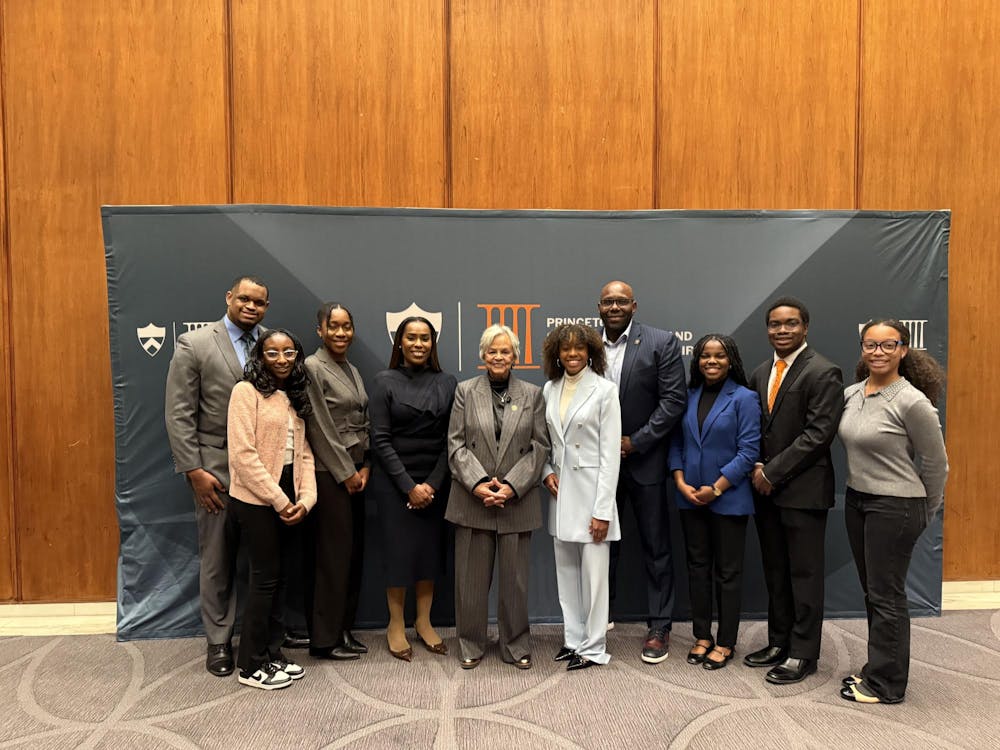The April showers couldn't keep them away. More than 200 people gathered to participate in the Affirmative Action Speak-Out held in Firestone Plaza yesterday. This group included President Shapiro, professors, administrators and students of many racial backgrounds.
Organized by the Black Men's Awareness Group and the Third World Center, the event was part of a nationwide day of rallies on affirmative action organized by Sabrina Comizzoli '92, a New York University Law School student.
Thirteen campus organizations supported the event including the USG and the Taiwanese American Students Association. Unlike most of yesterday's rallies across the nation, the Princeton event was intended as a discussion of affirmative action instead of simply a rally in support of it.
The event, which lasted from noon until 1:45 p.m. included six invited speakers and many others who spoke during the open mic period.
'A matter of social justice'
"It really makes Princeton part of the much larger university community. Today, we were very much active members of our generation," said BMAG member Antony Taylor '01, who organized the event.
In the opening speech, President Shapiro cited affirmative action in higher education as a "matter of social justice."
"As long as racial disparity and discrimination remain a part of our life, affirmative action is a morally appropriate response," he said.
In addition to a diverse student body, Shapiro said increased diversity of faculty and staff is "essential."

Shapiro said there were "people of good faith" on both sides of the argument. However, he said he felt affirmative action was the best means of achieving social justice.
Sociology professor and Wilson College Master Miguel Centeno said, "I may surprise a few of you by saying I don't like affirmative action."
However, Centeno went on to explain that preferences exist for many groups in society, racial minorities being only one of them.
"Until (we reach a perfect world), we are better off with the imperfect world of affirmative action," he said.

Associate Provost Joann Mitchell billed affirmative action as a "hand-up" not a "hand out" for individuals like herself from poor, rural backgrounds. "I stand proud as an affirmative action baby," she said.
Another self-professed beneficiary of affirmative action, English professor Claudia Tate, recalled her experience as one of the first batch of black students at the University of Michigan.
"If you take away affirmative action," she warned, "all the curly hair and blue jeans will disappear."
Benefits of affirmative action
Economics lecturer Elizabeth Bogan taught an economics lesson at the mic. In support of affirmative action, she explained that America's greatest resource in the 21st century would be its diverse workforce.
TWC director Heddye Ducree drew a philosophical parallel to the current debate on affirmative action.
"The denial of affirmative action would be America's way of rolling a boulder (and blocking) the cave," she said in an allusion to the allegory of the cave in Plato's Republic, in which the cave houses ignorance from the truth that lies in the world outside.
More than 15 undergrads, two grad students, one lecturer and one professor spoke after the opening speeches. Several students indicated that affirmative action was necessary given the United States' history of racism.
Others like TWC chair Janelle Wright '00, explained that "characteristics" beyond pure academic "qualifications" have always been a factor in admission, be it through preference for individuals by region, background or, most recently, race.
Though all speakers supported affirmative action, several students expressed the need to tackle issues beyond affirmative action legislation.
"Affirmative action is a band-aid. It doesn't deal with the real problem," said BMAG member Dave Bramble '98.
While the audience was diverse, a majority of the afternoon's speakers were African American. USG president David Ascher '99, who also spoke in favor of affirmative action, said he "was hoping to have heard more white males speak."
Future discussion
Taylor said he was "very happy with the event." He called for action and said a follow-up discussion organized by members of the BMAG and the USG is scheduled for next Wednesday.
BMAG member Gozie Onyema '00, who recited a poem lamenting a society that needs affirmative action, is organizing next week's follow-up discussion.
Noting the absence of speakers against affirmative action, Onyema said, "It makes no sense to have a discussion with everybody speaking at the same opinion."
Taylor said more discussion would be necessary.
"To me, the most important thing, whether you're pro or against affirmative action, is to debate the issue," he said.
"I assume we share a view of gender and racial equality," he said. "Is affirmative action a policy that moves us in the right direction?"







